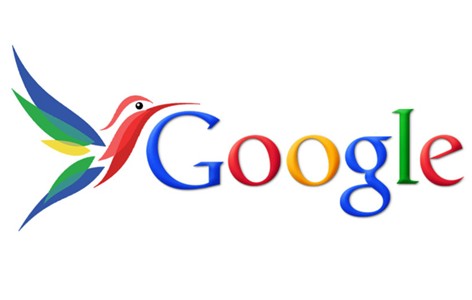
Since 2001, Google’s secret recipe for success has remained relatively untouched. Now the newest algorithm update will affect 90 percent of search queries and create a new chapter in the history of SEO. Hummingbird is a leap forward for Google as it understands natural language better than ever and directly presents answers to user searches. What is the future of search? Google’s Hummingbird update combined with Now, Plus, and Glass are giving us a glimpse.
Google Innovations
Before we can look at the most current innovations of Google and what lies ahead, we need to understand how Google became what it is today and the people behind it.
Those people I am referring to are Larry Page and Sergey Brin, the founders of Google. When these two met at Stanford University it was merely by coincidence, as Brin was assigned to show Page around the campus.
After collaborating on the creation of BackRub, a search engine that used links to determine the importance of individual web pages using the Stanford servers, it soon became apparent that this was something bigger and they had to expand. BackRub later became patented as PageRank after one of its creator’s, Larry Page,  and forever changed the way a website’s importance is measured.
From the beginning Google’s mission has been to organize the world’s information and make it universally accessible and useful.  During the first couple of years of Google Inc. they came up with 10 things that are truth (as it applies to them).  Those 10 things are:
- Focus on the user and all else will follow
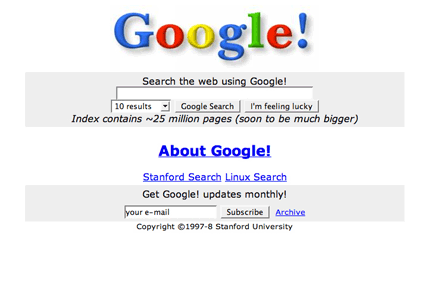
- It’s best to do one thing really, really well
- Fast is better than slow
- Democracy on the web works
- You don’t need to be at your desk to need an answer
- You can make money without doing evil
- There’s always more information out there
- The need for information crosses all borders
- You can be serious without a suit
- Great just isn’t good enough
These 10 things have played an important role in Google’s continued evolution of search, as they are always trying to improve search features and functions for the user and decrease the benefits for spammers.  This video from Google gives a brief yet informative look at some of these significant changes and the philosophy behind them.
As the video displayed, Google Inc. is always trying to create a better experience for its users through innovation. Here are some of the most notable Google updates since 2005:
- Nofollow Tag (2005): rel=â€nofollow†was introduced collectively with Yahoo and Microsoft this tag provides a way for webmasters to tell search engines “Don’t follow links on this page or “Don’t follow this specific link.â€(support.google.com)
- Universal Search (2007): a search system that blends listings from its news, video, images, local and book search engines as well as those it gathers from crawling web pages. Put an end to 10-listing SERP as we knew them. (searchengineland.com)
- Suggest (2008): this feature displayed suggested searches in a dropdown below the search box as visitors typed their queries.
- Google Instant (2010): an enhancement that shows results as you type
- Google+ (2011):Â a social media platform that is based on created circles where content could be shared. Â It is also highly integrated with other Google products such as Gmail.
- Search+ Your World (2012): taking the platform of Social Search and combining it with Personal Results, Profiles in Search and People and Pages to give users a more personalized experience. Â A toggle button was added to turn off those results when they were not wanted.
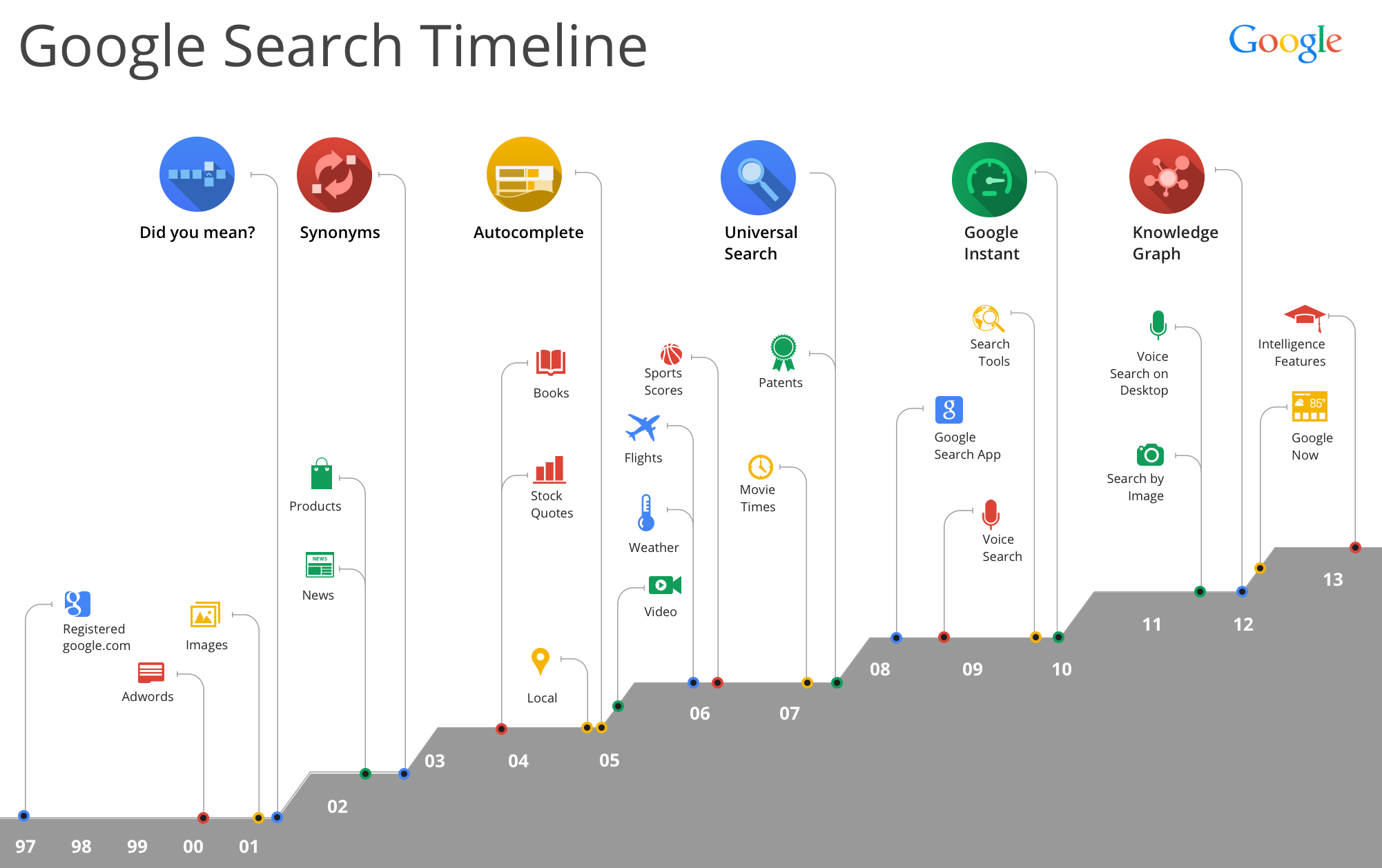
Google Hummingbird’s Impact
Though the “Caffeine Update†was a major change for Google in 2010, the last time the search engine dramatically re-wrote its search algorithm was in 2001. Previous updates like “Panda†and “Penguin†simply made changes to the old algorithm, whereas Hummingbird replaces the old algorithm entirely. Why call it “Hummingbird?†According to this Hummingbird FAQ (which we will refer to again later), Google chose the code name “Hummingbird†to emphasize how “precise and fast†the new system is.
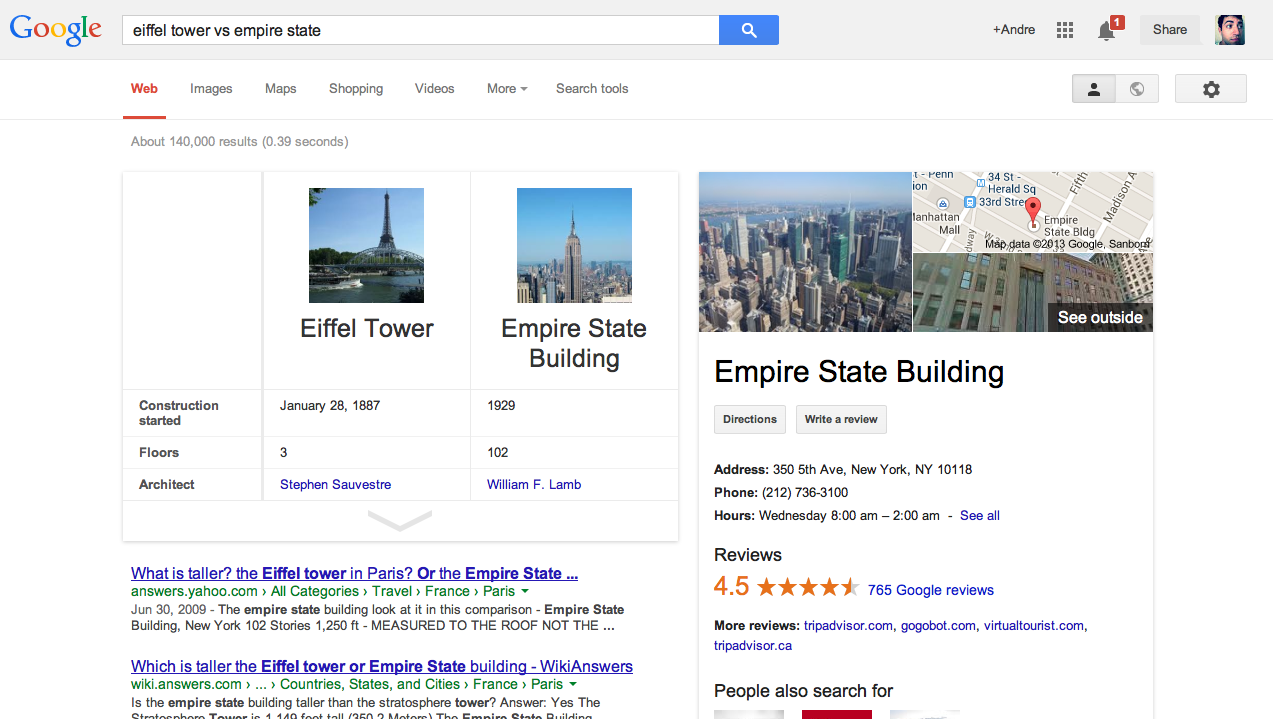
So what exactly has changed? You may have not even noticed it, but Google actually implemented Hummingbird a month before formally announcing it. Here are a couple of the most important and interesting changes to note:
- The Knowledge Graph: This new piece of technology is essentially what is allowing Google to now search for more than just the words in your query. It puts those words in a meaningful context and allows for better results to more complex queries. Learn more about the Knowledge Graph.
Conversational Search: Along the same lines, Google can now put meaning to an entire phrase. For example, a sentence like “where is the closest Mexican restaurant to here,†would have traditionally yielded results for sites with the words “Mexican,†“restaurant,†or even “Mexican restaurant†if you’re lucky. With Hummingbird, the entire phrase is contextualized, providing results closer to what you’re searching for. In addition, Hummingbird can string together series of queries, “remembering†the context of the search “conversation†and providing more detailed and relevant results than would have been possible. See a great example of Conversational Search.
SEO Isn’t Dead
First, to answer everybody’s question, SEO isn’t dead. As soon as you understand the basics of Hummingbird, it becomes apparent that the changes will merely weed out results unworthy of strong SEO. However, if you don’t understand the nuts and bolts of building quality SEO, may the odds be ever in your favor.
Rather than basing search results off of individual words in your query—the aim of Hummingbird is to identify the singular meaning behind your entire query. We’re all familiar with seeing SERP’s that offer irrelevant links that only show up because a few words in their meta description match your search keywords. Hummingbird wants to give you links that match your query’s meaning.
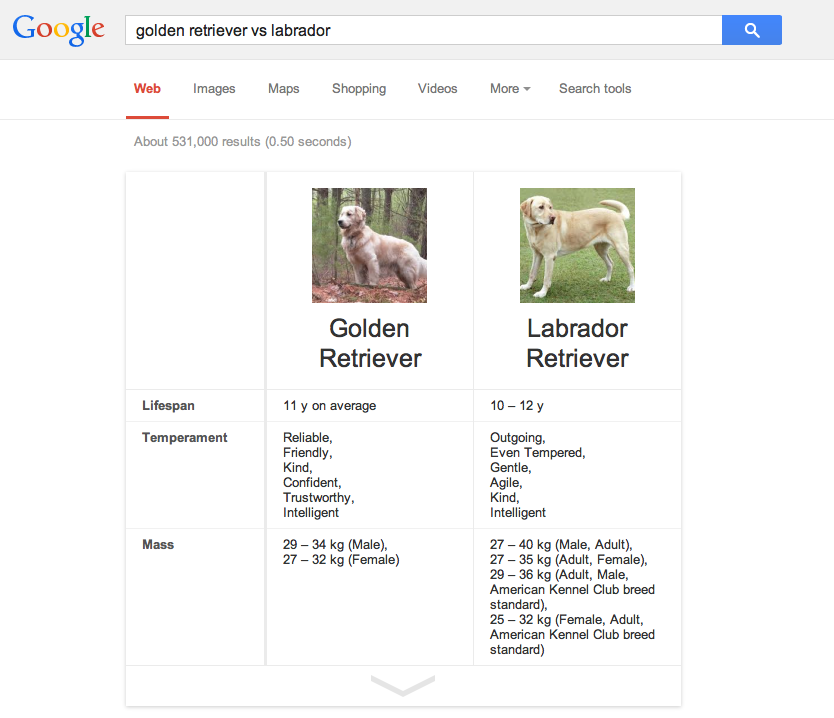
Danny Sullivan gave a helpful Hummingbird FAQ just after the changes were announced, and he explains why the death of SEO isn’t going to happen at the wings of Hummingbird. Signals that have always been important remain unchanged, and it all goes back to the central point of successful SEO: create and promote high-quality content.
Google Hummingbird’s impact is that the changes simply allow Google to sift through and rank your content more efficiently and effectively. Now that results are less keyword focused and more meaningful as a whole—the quality of your content’s meaning will be reflected in your SEO. If you’ve experienced a decrease in traffic in the last month, learn how to be flexible. Going forward, see the intent behind the queries people are searching and position yourself to be the meaningful answer they’re seeking.
The Future of Search: Now, Glass, Plus, and Hummingbird
Google dominates search and that dominance doesn’t appear to be weakening anytime soon. Even with this position of power, Google continues to innovate in search more than most of the competition. With Hummingbird, Google is giving us a glimpse of the future of search and where the company is heading. Understanding better how we use language is only part of the plan though. With products like Google Now, Google Glass, and Google+, the strategy starts to become more cohesive.
Google Now: How do you improve on search? Get rid of it. Google Now is that crazy new technology that starts to intelligently bring information forward without any action by users. Flight info, traffic on the way to work, nearby restaurant reviews, and favorite sports team scores will be presented at the right time and place.
Google Glass: We ask questions all day long. How do you merge the power of search with the real world? Stick it on your head. Google Glass aims to bring the digital world even further into the real world by giving users a glanceable screen near their eyes. Glass is not meant to be a screen to constantly stare at, but instead giving users vital information that gets out of their way. This includes Google Now-like information as well as results from Hummingbird-type searches.
Google+: How do you improve the quality of results? Make it personal. With Google+, Google is using the power of social networking to individualize search results to include content from the people you follow and care about.
What does this all mean for the future of search? Information will be presented to us before we even ask for it. When we do search, natural language will be deciphered to bring more relevant and social results immediately. All of this will be happening on our desktops, laptops, phones, watches, and even our glasses. Google is rapidly transforming the search industry and it will only continue to evolve. There will likely never be an end to innovation in search, but one thing is for sure: the search of today will look drastically different than the search of tomorrow.